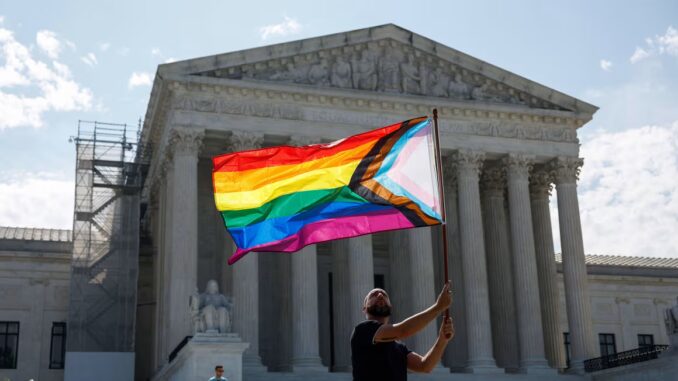
Maeve Bidonde, Staff Writer
Last week The Supreme Court of The United States declined to hear a challenge to their 2015 landmark decision to legalize same-sex marriage in the Obergefell v Hodges case. According to NPR, the challenge came from Kim Davis, a former Kentucky clerk who was previously known for refusing to issue marriage licenses to same sex couples after the Supreme Court made same sex marriage a constitutional right.
After her refusal, Davis was put in jail for contempt, and she ended up losing her clerk re-election. She was also ordered to pay $360,000 to a couple she refused to marry by a jury. She tried to get the court to assert that she was exempt from being held liable for her actions because she had a First Amendment religious protection.
The Sixth Circuit Court of Appeals rejected her appeal, citing a recent Supreme Court decision that said that public officials are not protected by the First Amendment. Judge Helene White wrote “wield the authority of the state to violate the constitutional rights of citizens if the official believes she is ‘follow[ing] her conscience,’” in her opinion that led to Davis’s appeal being denied.
The court rejected the petition and made no comments on it. Davis has felt that Obergefell v Hodges conflicts with religious liberties. NPR quotes Davis as saying “If ever there was a case of exceptional importance, the first individual in the Republic’s history who was jailed for following her religious convictions regarding the historic definition of marriage, this should be it.”
In Texas, the state Supreme Court adopted language that seemed to allow judges to not perform same-sex marriages on the basis of religious beliefs. When the constitutional right to abortion was overturned Justice Clarence Thomas wrote in his opinion that the Supreme Court should reconsider its stances on birth control, same-sex marriage, and same-sex intimacy.
Had the Supreme Court decided to hear the challenge same-sex marriage would remain federally protected due to the Respect for Marriage act former President Joe Biden signed into law in 2022. If Obergefell was turned over, individual states could have refused to recognize same-sex marriage.
According to The New York Times, in order for the petition to have been heard four out of the nine justices would have had to have voted to hear it. Many legal experts were not expecting the Supreme Court to not take that step. LGBTQ+ members and allies were concerned by the petition as the Trump Administration had already targeted the funding of LGBTQ+ community benefiting organizations.
Now as LGBTQ+ individuals and allies celebrate this win lawyers and advocates have said that they should remain vigilant about future attempts to overturn the landmark 2015 decision. Davis’ lawyer Mathew Staver told The New York Times that the case was “egregiously wrong from the start” and that “It is not a matter of if, but when the Supreme Court will overturn Obergefell.”
Leave a Reply